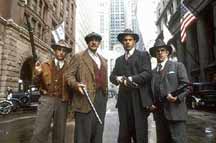Last night, I watched The Untouchables again on TV. I really enjoy this movie — it’s got a great cast and some fabulous cinematic moments (the baby carriage sequence in the train station, the showdown on the border…), and it’s a good story.
 The only problem is that I cannot watch that movie without constantly noting the parallels between the prohibition of that time and the one we suffer through today.
The only problem is that I cannot watch that movie without constantly noting the parallels between the prohibition of that time and the one we suffer through today.
Both Eliot Ness and Al Capone were creations of prohibition.
Capone used prohibition to create a huge, profitable black-market alcohol operation — and since much of the population used the product, it gave him additional cover. The violence he used were part of the black-market “business” to protect the profits. (Legal businesses use marketing, lawsuits and regulations to protect their business, while black-market business use violence and murder.)
Capone was also able to protect his business through the corruption of law enforcement (again because of the massive profits).
Ness was put in the position of stretching (even breaking) the law to pursue Capone.
“You wanna get Capone? Here’s how you get him. He pulls a knife, you pull a gun. He sends one of your men to the hospital, and you send one of his to the morgue.”
Today, it’s often (though not always) a different kind of stretching and breaking the law, through drug task force tactics and the incursions on civil liberties. But all the parallels exist — the black-market profits, increased violence, corruption, loss of public respect for the law, innocents caught in the cross-fire, and excessive law enforcement tactics.
At the end of The Untouchables, there’s a fascinating little moment that shows how little prohibition has to do with what it’s prohibiting. Most of Eliot Ness’ team has been murdered, and he has finally put Capone away for tax evasion when he’s approached by a reporter:
Reporter: They say they’re going to repeal prohibition. What will you do then?
Ness: I think I’ll have a drink.
Interesting parallel there with a recent statement by Canadian Prime Minister Jean Chrétien about marijuana:
“Perhaps I will try it when it will no longer be criminal.”
Prohibition generates its own life, spawning the warriors on both sides, and feeding off the devastation.
– Watching The Untouchables as good film-making — entertaining.
– Seeing that we have not learned anything — depressing.

